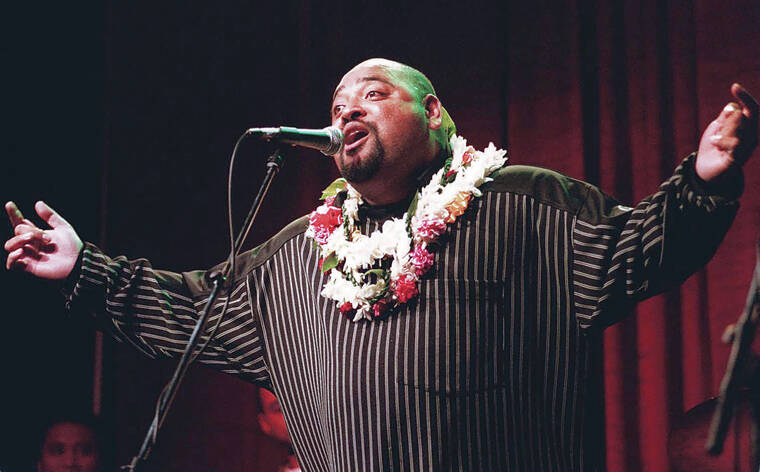George Brooks Veikoso, the iconic Polynesian vocalist known as Fiji, passed away on October 18, 2023, in Suva, Fiji, surrounded by his family. He was 55 years old. Veikoso had openly discussed his health struggles in recent years but continued to perform, often taking the stage while seated, yet still delivering the powerful vocals that endeared him to fans worldwide. The official cause of death has not yet been disclosed.
Longtime friend and fellow musician Jeff Rasmussen fondly recalled Veikoso as a dedicated performer who faced significant health challenges throughout his life. “We used to joke that we’d limp through the stages together,” Rasmussen said. “Despite the pain, he never slowed down. He worked hard all his life — it was always about the music.”
Rasmussen expressed deep sorrow over the loss of his friend, adding, “To us, he’s George. He’s braddah. He’s ‘Fij’. He was one of my best friends — the best man at my wedding.”
A Journey Rooted in Heritage
Born on May 10, 1970, just months before Fiji gained independence from British colonial rule, Veikoso took immense pride in his heritage, an aspect that defined his musical career. He left Fiji at the age of 14, passing through Hawaii before relocating to Los Angeles, but soon returned to Hawaii, where he began his music journey.
Veikoso’s early performances included singing with the local group Par Three at a restaurant called Someplace Else and participating in talent nights at Fast Eddie’s, a popular nightclub. His big break came in the early 1990s when he joined the Hawaiian Style Band, gaining recognition for his exceptional voice and stage presence. His solo debut album, “Evolution”, released in 1994, solidified his status as a prominent figure in local music.
In 1997, he released “Born & Raised”, which further established him as a star. The following year, he achieved significant acclaim at the Na Hoku Hanohano Awards, winning both male vocalist of the year and favorite entertainer of the year. Veikoso continued to release music prolifically, including “Gratitude” in 1999, showcasing a sound that blended reggae, R&B, hip-hop, and traditional Pacific influences, reshaping the “Jawaiian” genre.
Championing Indigenous Voices
As a native Fijian fluent in his language, Veikoso was acutely aware of the underrepresentation of Indigenous voices in mainstream music. He advocated for music that celebrated these identities, contributing to a shift toward original, homegrown sounds. His groundbreaking 2002 arrangement of “He Aloha Mele” for sumo champion Konishiki exemplified this effort, incorporating traditional instruments and a contemporary beat, bridging cultural divides.
Over his career, Fiji toured extensively, collaborated with numerous artists, and served as a mentor to emerging musicians across the Pacific. He is credited with paving the way for Polynesian artists in mainstream island music, demonstrating that deep cultural roots can coexist with commercial success. “We’re shocked and very sad,” said Vincent Mendoza, a longtime friend and collaborator. “He was so young. A legend was lost — an icon and an ambassador for our culture.”
Before his rise to fame, Veikoso immersed himself in Hawaii’s vibrant nightlife and music scene. Musician John Valentine reflected on the early days, recalling how Veikoso frequently attended performances at The Love Notes show at the Sheraton Waikiki. “One night, I invited him to sing with the band, and when he auditioned, he blew us away. He was overqualified,” Valentine noted. “He could sing, he could dance. I said yes right away, but then he told me he wanted to wait a couple of days — and that’s when he got signed to a record label.”
Valentine remembered Veikoso not only for his remarkable talent but also for his humble demeanor. “He was a sweetheart, always smiling and always in a good mood. He wasn’t a ‘star’ kind of guy — he was very humble.”
The music world mourns the loss of Fiji, whose legacy will continue to inspire future generations of artists. His contributions to island music and his dedication to celebrating his cultural roots have left an indelible mark on the industry.
